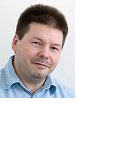|
|
|
<<< Previous speaker
|
next speaker >>>
|
John Davies

John is CTO/co-founder of C24. Founded in 2000, C24 hit the market a year later with an innovated Java-binding technology for financial services messaging standards. Integration Objects (IO) can generate Java code for almost every financial services messaging standard, from FpML (including validation rules) to SWIFT. It is unique niche in the market has seen it OEMd by many of the leading middleware, messaging and application server vendors. The largest clients now feed over $500million of trades a day through the code, the fastest process thousands of messages second.
The wide coverage of C24-IO has given John a unique view into the internals of many of the world leading financial institutions. John has nearly 20 years in Investment Banking and over 25 years in IT, mostly as a consultant. He has co-authored several books on Java and J2EE, was the author of Learning Trees distributed Java course and a regular speaker on grid, Jini and JavaSpaces in the Java and banking world. Over the years John has held more than one high-profile position as Head of Technical Architect in banks such as JPMorgan.
|
Presentation: "XML Persistence"
Time:
Monday 11:30 - 12:20
Location:
Store Sal
Abstract: For decades the centre of the enterprise was the relational database; everything had to eventually communicate with the database. Many of the technologies even as recently as ten years ago were database centric, EJBs for example. It's fare to say that XML was in it's very earliest stages at the turn of the millennium, it existed but we were still struggling with DTDs. Today it's difficult to imagine an enterprise without some form of XML, most of today's systems, both internal and external send and receive hierarchical messages, usually in XML. Even niche standards like SWIFT are hierarchical in structure. The problem with all this is the impedance mismatch between hierarchical messaging and relational persistence. Object-Relational Matching (ORM) provides a good solution at the simplistic level and solves many problems but is incredibly time consuming and leaves a static binding between the ever-changing message and static relational database as things get more complex. Squeezing hierarchical messages into relational databases with ORM is costly and not maintainable in the long term. This talk explores several ideas for persisting hierarchical data.
Presentation: "Cloud Panel Discussion"
Time:
Monday 15:40 - 16:30
Location:
Lille Sal
Abstract: The premise is simple. In the future, we won't have or even need all our data or software programs on our own computers -- they'll be floating around somewhere on somebody else's servers, accessible via the internet. A vast, interconnected "nebula" of other people's data and servers, aka the "Cloud". Is this Web 3.0, SOA 2.0, something entirely different, or the same old stuff once again repackaged by the marketing department? Listen to our industry experts' views and opinions (they are sure to have many!) as they debate what it means to live in the cloud. Conferences are all about interaction, so please come and interact with us by posing questions to the panel.
|
 |
| |



